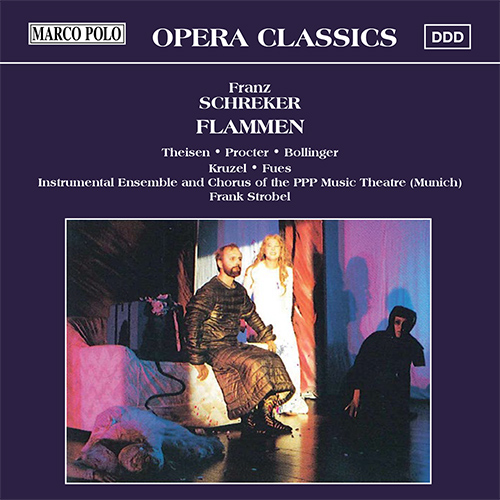Currently not available on CD.
SCHREKER: Flammen
Tracklist
Tingaud, Jean-Luc (Conductor)
Tingaud, Jean-Luc (Conductor)
Sicard, S. - Lyricist
Fourcaud, Louis de - Lyricist
Tingaud, Jean-Luc (Conductor)
Royal Conservatoire of Scotland Voices (Choir)
Tingaud, Jean-Luc (Conductor)
Tingaud, Jean-Luc (Conductor)
Tingaud, Jean-Luc (Conductor)
Tingaud, Jean-Luc (Conductor)
Royal Conservatoire of Scotland Voices (Choir)
Tingaud, Jean-Luc (Conductor)
Tingaud, Jean-Luc (Conductor)
Royal Conservatoire of Scotland Voices (Choir)
Tingaud, Jean-Luc (Conductor)
Tingaud, Jean-Luc (Conductor)
Royal Conservatoire of Scotland Voices (Choir)
Tingaud, Jean-Luc (Conductor)
Tingaud, Jean-Luc (Conductor)
RCS Voices was established at the Royal Conservatoire of Scotland in 2014 by its founder and director Tim Dean to give performing opportunities to talented young singers. The ensemble can vary in size and nature according to repertoire, and is designed to explore music from all periods.
The group gave its first public performances in Glasgow in 2015, and shortly after was invited to participate in the Cottiers Chamber Music Project, which was recorded and broadcast on BBC Radio 3. Also in 2015, the ensemble made its Edinburgh International Festival (EIF) debut as the chorus in Stravinsky’s The Rake’s Progress with the Scottish Chamber Orchestra conducted by Sir Andrew Davis, under whom it performed in the EIF’s 2019 production of Götterdämmerung alongside the Royal Scottish National Orchestra.
RCS Voices has appeared at St Mary’s Cathedral, Glasgow, and the St Magnus International and Aberdeen International Youth Festivals. The ensemble also frequently appears with the BBC Scottish Symphony Orchestra under Thomas Dausgaard.
For more information, visit www.rcs.ac.uk.
 |
Formed in 1891, the Royal Scottish National Orchestra (RSNO) is one of Europe’s leading symphony orchestras. Many renowned conductors have contributed to its success, including Sir John Barbirolli, Sir Alexander Gibson and Neeme Järvi. Thomas Søndergård has been the orchestra’s music director since 2018.
The RSNO performs across Scotland and appears regularly at the Edinburgh International Festival and the BBC Proms in addition to international tours.
With a widely acclaimed discography, the RSNO has previously appeared on BIS in a cycle of Rachmaninov’s symphonies as well as in programmes of music by James MacMillan, Ge Gan-ru and Sally Beamish.


Jean-Luc Tingaud studied with the French conductor Manuel Rosenthal.
Notable opera engagements have included Pénélope and Le Roi malgré lui (Wexford Festival Opera), Roméo et Juliette (Arena di Verona), Faust (Macerata), The Turn of the Screw (Lille), Dialogues des Carmélites, La Bohème and Madama Butterfly (Pittsburgh), La Fille du régiment (Madrid), Pelléas et Mélisande (Prague National Theatre), Les Pêcheurs de perles (English National Opera), Spontini’s Fernand Cortez (Florence), L’Ange de Nisida (Donizetti Opera festival, Bergamo), Carmen (Tokyo) and Lakmé(Beijing).
Orchestras he has conducted include the Royal Philharmonic Orchestra, English Chamber Orchestra, Bournemouth Symphony Orchestra, Filarmonica Arturo Toscanini, the Warsaw and Kraków Philharmonics, Orchestre National des Pays de la Loire, Orchestre National de Lyon, Tokyo Philharmonic Orchestra, the Rundfunk-Sinfonieorchester Berlin and the orchestras of the Teatro Carlo Felice, Genoa and the Teatro Massimo, Palermo.
His recordings include Sapho (Wexford), Werther (Martina Franca), La Voix humaine (Compiègne) and Le Siège de Corinthe (Bad Wildbad) and, most recently for Naxos, works by Dukas (8.573296), Bizet (8.573344), D’Indy (8.573522), Poulenc (8.573739), Franck (8.573955), Massenet (8.574178) and the Franck and Chausson symphonies (8.574536).

Born in Liège in 1822, César Franck was originally intended by his father for a career as a virtuoso pianist. In Paris his nationality excluded him at first from the Conservatoire, where he eventually failed to achieve the necessary distinction as a performer, turning his attention rather to composition. In 1846 he left home and went to earn his living in Paris as a teacher and organist, winning particular fame in the second capacity at the newly built church of Ste Clotilde, with its Cavaillé-Coll organ. He drew to himself a loyal and devoted circle of pupils and in 1871 won some official recognition as the nominated successor of Benoist as organ professor at the Conservatoire. A man of gentle character, known to his pupils as ‘Pater seraphicus’, he exercised considerable influence through his classes and performances although he remained, as a composer, something of an outsider in a Paris interested largely in opera.
Orchestral Music
Franck’s best-known orchestral works are the Symphonic Variations for solo piano and orchestra and the Symphony in D minor, completed in 1888 and first performed at a Conservatoire concert the following year. A brief series of symphonic poems includes the early Ce qu’on entend sur la montagne (‘What is heard on the mountain’), based on Victor Hugo’s Le Chasseur maudit (‘The Accursed Huntsman’); Les Djinns, again after Hugo; and Psyché, a symphonic poem with chorus.
Sacred Music
Franck wrote a number of large-scale choral works on biblical subjects, as well as smaller-scale works for occasional or liturgical use. This last category includes the well-known Panis angelicus of 1872, originally for tenor, organ, harp, cello and double bass. Panis angelicus was later interpolated into the three-voice Mass of 1861.
Chamber Music
Franck wrote one violin sonata, which, like his symphony, is united by a cyclic use of thematic material that connects the movements. There is also a fine piano quintet, completed in 1879, and a final string quartet, written in 1890.
Organ Music
As a very distinguished organist, Franck wrote remarkably little for the instrument on which his improvisations had won him fame and pupils. Organ compositions published include Trois Chorals of 1890 and Trois Pièces, written a dozen years earlier. The six organ pieces published in 1868 are entitled Fantaisie; Grande Pièce Symphonique; Prélude, fugue et variation; Pastorale; Prière; and Final.
Piano Music
Franck’s earlier piano music was designed for his own virtuoso performance. Two later works remain in general repertoire: the Prélude, choral et fugue of 1884 and the Prélude, aria et final, completed in 1887.































